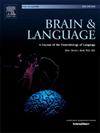Abstract sentence meanings are grounded in the sensory-motor regions in a context-dependent fashion
IF 2.3
2区 心理学
Q1 AUDIOLOGY & SPEECH-LANGUAGE PATHOLOGY
引用次数: 0
Abstract
Sentences conveying abstract meanings are crucial tools for high-level thinking and communication. Previous research has sparked a debate on whether abstract concepts rely on the representation of the sensory-motor brain areas. We explored this issue with the assumption that abstract meanings at the sentence level could invoke the sensory-motor regions a context-dependent fashion. With a sentence comprehension task and functional MRI, we measured the neural response patterns of sentences with multimodal abstract meaning, which were presented following context sentences describing either concrete sound-related or action-related events. Multivariate pattern analyses revealed that neural responses to sentences could discriminate abstract sentences in sound- versus action-related contexts, and also context sentences describing these two types of events. The discrimination was manifested in the regions responsible for high-level auditory perception and action execution. Our finding indicates that abstract meanings in modality-specific contexts may require a certain degree of grounded processing in the sensory-motor regions.
抽象句子的意义以上下文依赖的方式建立在感觉-运动区域
表达抽象意义的句子是高层次思维和交流的重要工具。先前的研究引发了一场关于抽象概念是否依赖于感觉运动脑区的表征的争论。我们通过假设句子层面的抽象意义可以以上下文依赖的方式调用感觉-运动区域来探讨这个问题。通过句子理解任务和功能磁共振成像,我们测量了具有多模态抽象意义的句子的神经反应模式,这些句子是在描述具体声音相关或动作相关事件的上下文句子后呈现的。多变量模式分析表明,句子的神经反应可以区分声音和动作相关语境中的抽象句子,以及描述这两种类型事件的语境句子。这种歧视在负责高级听觉感知和行动执行的区域表现出来。我们的发现表明,在模态特定的语境中,抽象意义可能需要在感觉-运动区域进行一定程度的基础处理。
本文章由计算机程序翻译,如有差异,请以英文原文为准。
求助全文
约1分钟内获得全文
求助全文
来源期刊

Brain and Language
医学-神经科学
CiteScore
4.50
自引率
8.00%
发文量
82
审稿时长
20.5 weeks
期刊介绍:
An interdisciplinary journal, Brain and Language publishes articles that elucidate the complex relationships among language, brain, and behavior. The journal covers the large variety of modern techniques in cognitive neuroscience, including functional and structural brain imaging, electrophysiology, cellular and molecular neurobiology, genetics, lesion-based approaches, and computational modeling. All articles must relate to human language and be relevant to the understanding of its neurobiological and neurocognitive bases. Published articles in the journal are expected to have significant theoretical novelty and/or practical implications, and use perspectives and methods from psychology, linguistics, and neuroscience along with brain data and brain measures.
 求助内容:
求助内容: 应助结果提醒方式:
应助结果提醒方式:


